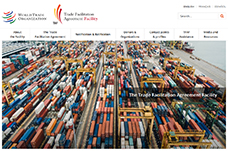MORE:
Since the PCTF last met on 11 June, the number of acceptance instruments received has tripled, the WTO secretariat informed members. Taking account the fact that one of the ratifications — that of the European Union — covers 28 members, the total number of ratifications received now covers 49 WTO members, or around 45 per cent of the total needed to bring the TFA into force.
Especially encouraging are the number of least developed countries (3) that have now submitted their ratification instruments.
Ambassador Esteban Conejos (Philippines), the chairman of the PCTF, described the increasing number of ratifications as a "very welcome development" and said that he expected to have a substantial number of new ratifications when the committee next meets in February 2016.
Two-thirds of the WTO's membership will need to ratify the TFA in order for the agreement to take legal effect.
In addition to the EU, WTO members that have ratified the TFA are Hong Kong China, Singapore, the United States, Mauritius, Malaysia, Japan, Australia, Botswana, Trinidad and Tobago, the Republic of Korea, Nicaragua, Niger, Belize, Switzerland, Chinese Taipei, China, Liechtenstein, Lao PDR, New Zealand, Thailand and Togo.
Additional ratifications in the pipeline
Several WTO members informed the PCTF that they were close to completing their domestic acceptance procedures. Panama said its government was currently drafting a document that would allow it to deposit its TFA ratification instrument and that it expected to submit it well in advance of the WTO's 10th Ministerial Conference (MC10) in Nairobi in December. Pakistan said it was in an advanced stage of its domestic procedures and that it expected the matter would be taken up by the government's cabinet any day. Nigeria also outlined procedures under way to secure domestic acceptance and said that it expected to be able to submit its ratification instrument before December.
Montenegro said its parliament was in the final phase of ratifying the TFA and that it expected to submit its instrument before MC10, while Madagascar said ratification was well under way in its national parliament.
The TFA broke new ground for developing and least-developed countries in the way it will be implemented. For the first time in WTO history, the requirement to implement the Agreement was directly linked to the capacity of the country to do so. In addition, the Agreement states that assistance and support should be provided to help them achieve that capacity.
To benefit from this, developing and LDC Members must notify the WTO which provisions they will implement when the Agreement enters into force or, in the case of LDCs, within one year after entry into force (Category A commitments); which provisions they will implement after a transitional period following the entry into force of the Agreement (Category B); and which provisions they will implement on a date after a transitional period following the entry into force of the Agreement and that require the acquisition of assistance and support for capacity building (Category C).
Category A notifications
The number of Category A notifications submitted by developing and least developed country members continues to increase. Ambassador Conejos noted that, since the last PCTF meeting in June, the committee has received new Category A notifications from Trinidad and Tobago, Barbados, Uganda, Belize, Lao PRD, Saint Lucia and the Seychelles.
This brings the overall number of Category A notifications submitted to 72, he said, which already offers a good picture of members' implementation plans in this field.
A number of members reported on their experiences in carrying out domestic reforms needed to meet the commitments under the TFA, their efforts to secure ratification of the agreement, and challenges they faced. China said it was committed to ensuring early implementation of the TFA and noted that implementation of one of the commitments — the establishment of a “single window” — would be carried out throughout the country next year. Senegal noted that it has initiated trade facilitation programs but cited constraints in transit and infrastructure, and called on its WTO partners to help it secure the financing needed to implement its TFA commitments. Madagascar said it would submit its Category A notification soon and welcomed the support it has received to prepare needs assessments and request assistance.
Background
Concluded at the WTO’s 2013 Bali Ministerial Conference, the Trade Facilitation Agreement contains provisions for expediting the movement, release and clearance of goods, including goods in transit. It also sets out measures for effective cooperation between customs and other appropriate authorities on trade facilitation and customs compliance issues. It further contains provisions for technical assistance and capacity building in this area.
The Protocol of Amendment inserting the TFA into Annex 1A of the WTO Agreement was subsequently adopted by the General Council on 27 November 2014. This in turn opened the door for members to formally accept the TFA through their domestic legislative procedures.
More information on trade facilitation and the TFA can be found at www.wto.org/tradefacilitation.
Dedicated website for the Trade Facilitation Agreement Facility
This site serves as a focal point for WTO members, donors and others seeking information on the TFAF.
> Problems viewing this page?
Please contact [email protected] giving details of the operating system and web browser you are using.

